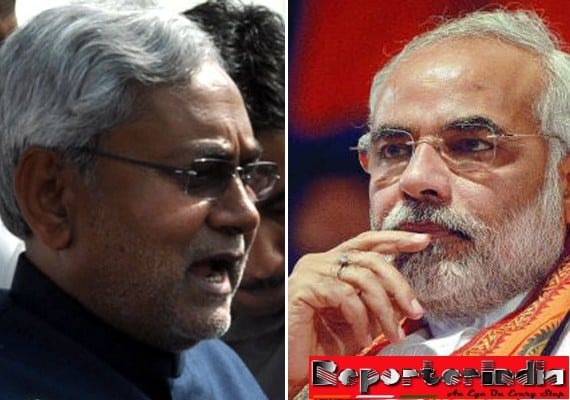Ashadh Shukla Shashthi, Kaliyug Varsha 5114
By Tavleen Singh
 Nitish Kumar and Narendra Modi |
Now that the Chief Minister of Bihar has dragged ‘succularism’ into the political discourse, it is time to deconstruct it so that we can end this pointless debate once and for all. I have deliberately mis-spelt the word because when said in Hindi that is how it is usually pronounced. It is a hard word to write in devnagri and the Hindi and Urdu equivalents do not quite mean what secularism has come to mean in the Indian political context. It is a foreign word that evolved in a European context when the powers of the church and the state were separated. In India, since none of our religions were led by pontiffs who controlled armies, or had vast temporal powers, we had no need to make this separation. But, the word secularism is used in India more than almost any other country. Why?
Well, because when we entered our current era of coalition governments, political parties of leftist disposition found it convenient to keep the BJP out of power by saying they would only ally with ‘succular phorces’. The BJP became a pariah after the Babri Masjid came down and so whenever someone like Nitish Kumar wants to hurl abuse at the party he is in alliance with in Bihar, or one of its leaders, the ‘secularism’ debate gets revived.
Currently, he appears to be positioning himself for prime minister in 2014 and seems to believe that he will only be in the running for this job if he can eliminate Narendra Modi before the race begins. He is not alone in this endeavour. On my wanderings in Delhi’s corridors of power last week, I ran into journalists and politicians who went on and on about how Modi could never be prime minister because of the violence in Gujarat in 2002.
They said pretty much what the Chief Minister of Bihar, and his cohorts, have said which is that the prime minister must be a man who is ‘clean and secular’. So how do we explain Rajiv Gandhi? How should we understand why he was given the biggest mandate in Indian parliamentary history after justifying the pogroms that killed thousands more Sikhs in 1984 than Muslims were killed in Gujarat in 2002? Were Indian voters un-secular when they gave him more than 400 seats in the Lok Sabha?
If there were still a chance of major communal riots in the future, there may have been some point to reviving this talk of secularism. But, there has not been a single major Hindu-Muslim riot since 2002 despite Muslims from next door having been responsible for the worst terrorist attack on Indian soil in 2008. Before 26/11, there were other attacks by Islamists on Hindu temples, commuter trains in Mumbai, stadiums in Hyderabad and bazaars in Delhi. None of these ugly acts of violence caused riots. Our 24-hour news channels have made communal riots impossible and the average Muslim has begun to understand this. I noticed this while travelling in Uttar Pradesh during the recent elections.
So let us stop this silly talk of secularism and communalism and start demanding from those who want to become India’s next prime minister that they tell us what they can do for this country. Here is my own list of questions. What will the next Prime Minister do to end the licence raj that prevents the education system from achieving its full potential? What will he do to fix our broken public healthcare system? What will he do to make sure that every Indian has enough electricity to at least light a few bulbs and run a ceiling fan in his home? What will he do to create new jobs for the estimated 13 million young Indians who enter the job market every year? What will he do to revive the Indian economy? What steps will he take to ensure that India becomes a fully developed country by the middle of this century?
When I heard Aung San Suu Kyi’s address to both houses of Britian’s Parliament in Westminster hall last week, what impressed me was the clarity with which she spelt out her vision for her country. But, throughout her speech, something kept bothering me and by the time she finished, I discovered what it was. What bothered me was that I could not think of a single Indian leader who could make such a speech.
The Indian political landscape today has become a desert in which only the stunted progeny of stunted political leaders bloom. We need our political parties to throw up real leaders and we need a political discourse in which real political problems are discussed. So can we stop fishing ‘secularism’ out of the dustbin of history and holding it up as a shining ideal? Its relevance faded a long time ago.
Source: indianexpress
Now we all need to get rid of this ‘Secularism’ and establish Hindu Rashtra having righteous and patriotic rulers. Only Hindu Rashtra can provide us a governance that is needed to make this country secure and prosperous ! – HJS




